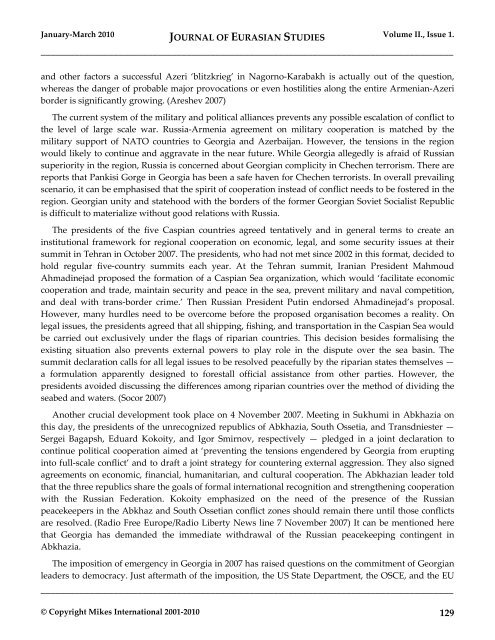EurasianStudies_0110..
EurasianStudies_0110..
EurasianStudies_0110..
You also want an ePaper? Increase the reach of your titles
YUMPU automatically turns print PDFs into web optimized ePapers that Google loves.
January-March 2010 JOURNAL OF EURASIAN STUDIES Volume II., Issue 1.<br />
_____________________________________________________________________________________<br />
and other factors a successful Azeri ‘blitzkrieg’ in Nagorno-Karabakh is actually out of the question,<br />
whereas the danger of probable major provocations or even hostilities along the entire Armenian-Azeri<br />
border is significantly growing. (Areshev 2007)<br />
The current system of the military and political alliances prevents any possible escalation of conflict to<br />
the level of large scale war. Russia-Armenia agreement on military cooperation is matched by the<br />
military support of NATO countries to Georgia and Azerbaijan. However, the tensions in the region<br />
would likely to continue and aggravate in the near future. While Georgia allegedly is afraid of Russian<br />
superiority in the region, Russia is concerned about Georgian complicity in Chechen terrorism. There are<br />
reports that Pankisi Gorge in Georgia has been a safe haven for Chechen terrorists. In overall prevailing<br />
scenario, it can be emphasised that the spirit of cooperation instead of conflict needs to be fostered in the<br />
region. Georgian unity and statehood with the borders of the former Georgian Soviet Socialist Republic<br />
is difficult to materialize without good relations with Russia.<br />
The presidents of the five Caspian countries agreed tentatively and in general terms to create an<br />
institutional framework for regional cooperation on economic, legal, and some security issues at their<br />
summit in Tehran in October 2007. The presidents, who had not met since 2002 in this format, decided to<br />
hold regular five-country summits each year. At the Tehran summit, Iranian President Mahmoud<br />
Ahmadinejad proposed the formation of a Caspian Sea organization, which would ‘facilitate economic<br />
cooperation and trade, maintain security and peace in the sea, prevent military and naval competition,<br />
and deal with trans-border crime.’ Then Russian President Putin endorsed Ahmadinejad’s proposal.<br />
However, many hurdles need to be overcome before the proposed organisation becomes a reality. On<br />
legal issues, the presidents agreed that all shipping, fishing, and transportation in the Caspian Sea would<br />
be carried out exclusively under the flags of riparian countries. This decision besides formalising the<br />
existing situation also prevents external powers to play role in the dispute over the sea basin. The<br />
summit declaration calls for all legal issues to be resolved peacefully by the riparian states themselves —<br />
a formulation apparently designed to forestall official assistance from other parties. However, the<br />
presidents avoided discussing the differences among riparian countries over the method of dividing the<br />
seabed and waters. (Socor 2007)<br />
Another crucial development took place on 4 November 2007. Meeting in Sukhumi in Abkhazia on<br />
this day, the presidents of the unrecognized republics of Abkhazia, South Ossetia, and Transdniester —<br />
Sergei Bagapsh, Eduard Kokoity, and Igor Smirnov, respectively — pledged in a joint declaration to<br />
continue political cooperation aimed at ‘preventing the tensions engendered by Georgia from erupting<br />
into full-scale conflict’ and to draft a joint strategy for countering external aggression. They also signed<br />
agreements on economic, financial, humanitarian, and cultural cooperation. The Abkhazian leader told<br />
that the three republics share the goals of formal international recognition and strengthening cooperation<br />
with the Russian Federation. Kokoity emphasized on the need of the presence of the Russian<br />
peacekeepers in the Abkhaz and South Ossetian conflict zones should remain there until those conflicts<br />
are resolved. (Radio Free Europe/Radio Liberty News line 7 November 2007) It can be mentioned here<br />
that Georgia has demanded the immediate withdrawal of the Russian peacekeeping contingent in<br />
Abkhazia.<br />
The imposition of emergency in Georgia in 2007 has raised questions on the commitment of Georgian<br />
leaders to democracy. Just aftermath of the imposition, the US State Department, the OSCE, and the EU<br />
_____________________________________________________________________________________<br />
© Copyright Mikes International 2001-2010 129

















